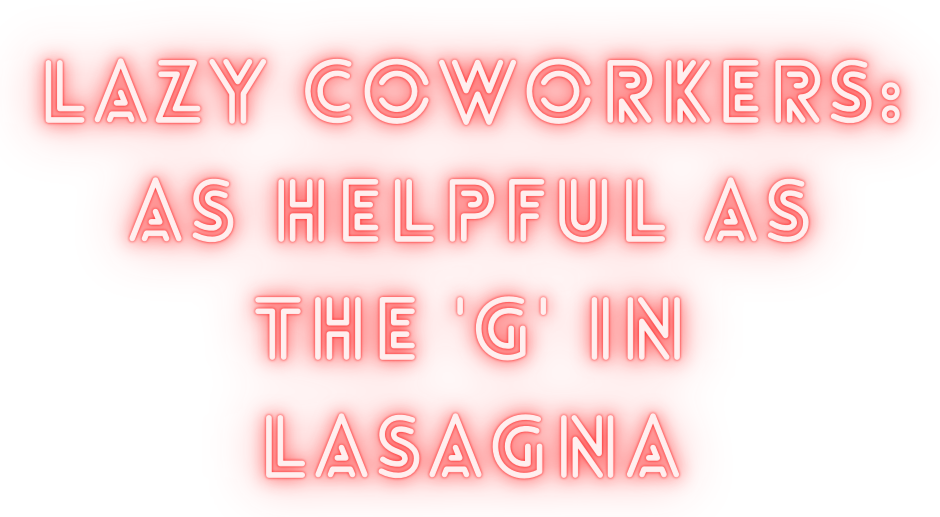
By Yvonne Milosevic
Ahhh, the lazy coworker—just about every workplace has one. There’s the guy who comes in late and leaves early, takes two-hour lunch breaks, and has turned procrastination into an art form. Then there’s the gal who always delegates but still has a million excuses for why she couldn’t finish that report on time. Assuming the slacker at work isn’t you, we’re betting everyone finds their behavior beyond exasperating.
Today, we’re sharing tips gleaned from Harvard Business Review to help you manage the office slacker. But before you start adopting these troubleshooting tactics, you’ll need to make an honest assessment of the situation. First, does their lazy behavior harm you directly? If the answer is no, then you should zip it and keep on keeping on. Unless their performance is hurting the company, your best bet, in that case, is to ignore it.
But if that lazy colleague is dragging you down, consider these four strategies and see which one(s) you can use to improve your situation.
Strategy #1 Address the issue candidly with the lazy coworker.
Before complaining about the behavior, try to find out if anything is going on behind the scenes that’s causing their inattention. They may be dealing with illness, child or eldercare issues, divorce, inadequate training, or just plain feeling overwhelmed. If they’re shirking responsibilities because of any of these life challenges, it’s okay to lend a hand temporarily.
Use tact as you express your concerns and explain how their slacking is affecting your work. They may not have realized that their behavior is impacting others on the team. Best case (though unfortunately rare) scenario, they will course-correct on their own.

Strategy #2 Talk to your boss.
If that doesn’t remedy the situation, you may have to loop in your boss. Tread with care and be professional when you speak with your supervisor. Let them know that you’ve tried to handle the matter on your own, to no avail.
Present the issue as a discussion about the challenges you’re facing that prevent you from doing your best work. Another option is to request joint feedback from your boss, suggests Professor Brian Uzzi of the Kellogg School of Management.
“Your boss will ask probing questions about the project, and it will become obvious who dropped the ball,” Uzzi says. If your coworker cares about their job, you’ll have more leverage to suggest ways to improve next time, he adds. What’s more, Uzzi predicts your colleague will feel grateful. “The other person will be looking for solutions that take the pressure off.”
Strategy #3 Ask for more solo projects.
You may (rightfully) fear that the slacker at work is dragging you down professionally. In that case, ask to take on more solo projects or responsibilities, where you can prove your competence without being hamstrung by the lazy coworker.
According to business professor Judith White of the University of Illinois at Urbana-Champaign, asking for individual assignments can “reduce your interdependence on this questionable colleague.”
“You might say, ‘I love being on the team, but I’m looking for new challenges, and I want to do more. Are there any solo tasks I could take on?’” White suggests. That way, you can prove your abilities and “give your boss another way to evaluate you and your performance.”
Strategy #4 Bring in a third person to shake up the dynamic.
Sometimes, personality problems impede progress. If you can bring a new person into the mix, it might improve the dynamic between you and your slacker coworker. “Paired relationships often fall out of balance,” Uzzi notes. “There may be something about the two of you that dampens [your colleague’s] creativity or hurts their motivation.”

The addition of a third party “changes your chemistry,” he adds. “Perhaps this person provides new skills that neither of you have; maybe they inject some creativity; or maybe they’re a sounding board and can offer feedback.”
If you cannot incorporate a new person into your project, Uzzi thinks you can still benefit from their influence in other ways. “Even just going out to lunch with them” might improve your interactions with the underperforming colleague, he says. “The third party helps create social and professional incentives” to do better.
Finally, we’ll leave you with this pro tip: Don’t cover for the slacker at work. Ignoring the bad behavior only seems like the easier option. But giving your slacking coworkers a free pass, or even taking the blame for their mistakes, only enables them to continue their lazy ways. In the long run, confronting the situation will be better not only for you but for your company, too.


